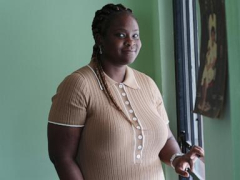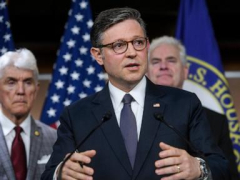MIAMI — Refugees had been arriving in the United States at levels unseen in nearly three decades, assisted by nonprofits and ordinary people across the political spectrum.
More than 160,000 Americans across every state signed up to resettle newcomers through the Welcome Corps, a public-private effort launched two years ago. More than 800,000 new arrivals from Cuba, Haiti, Nicaragua, Venezuela, Ukraine and Afghanistan were also welcomed with help from financial supporters through a legal tool known as humanitarian parole.
That screeched to a halt after President Donald Trump’s inauguration and his administration’s immediate 90-day suspension of the U.S. Refugee Admissions Program — a move that stranded thousands of vetted refugees, cut nonprofits’ staffing and left sponsors uneasy about the future of fledgling programs they felt had enriched their own lives.
Rivly Breus is among those feeling anxious. Working from a pastel peach house in South Florida, the crisis counselor has backed the resettlement of more than 30 people from Haiti, Ukraine and Cuba. She wanted to show them how to “thrive,” she said, rather than “being in survival mode all the time.”
“It’s also left us in limbo because we’re not able to answer some of the questions that our sponsees have,” Breus said. “We’re not able to give them the encouragement that we usually do, or the hope.”
New sponsorship pathways increased U.S. resettlement capacity in recent years.
Humanitarian parole had been applied for seven decades towards migrants unable to use standard routes. The Biden administration expanded it for Ukrainians and with another program known as CHNV allowing up to 30,000 monthly entrants from Cuba, Haiti, Nicaragua and Venezuela. The intention was to dissuade illegal border crossings by providing two-year work authorizations, though they weren’t a path to citizenship.
Migrants needed to clear security checks and have U.S.-based financial supporters. The nonprofit Welcome.US launched a platform to safely connect parolees and sponsors.
The State Department allowed private sponsors to ease refugees’ transition through the Welcome Corps beginning in January 2023. Groups of five or more sponsors had to secure at least $2,425 per refugee and commit to planning transportation, housing, education and employment. They could match with pre-approved applicants or name a specific refugee.
“Private sponsorship means we’re not asking a government or the taxpayer to fund this,” Ed Shapiro, a leading Welcome Corps funder, said in an email. “We’re saying, ‘Let us do this for our citizens, religious organizations, businesses and universities who want (or in some cases, need) to do this.’”
More than 9,000 sponsors have welcomed over 4,500 refugees since the program’s first arrivals in June 2023. Private philanthropists and GoFundMe.org established a fund to overcome financial barriers.
The idea was that sponsor circles could provide instant social capital and aid assimilation in a more meaningful way than government case workers.
“It was an initiative that I think was really energizing for folks,” said Marissa Tirona, president of Grantmakers Concerned with Immigrants and Refugees. “(For) everyday folks, neighbors, communities to establish more welcoming localities across the United States.”
Proponents pitched sponsorship as an intimate form of servi




